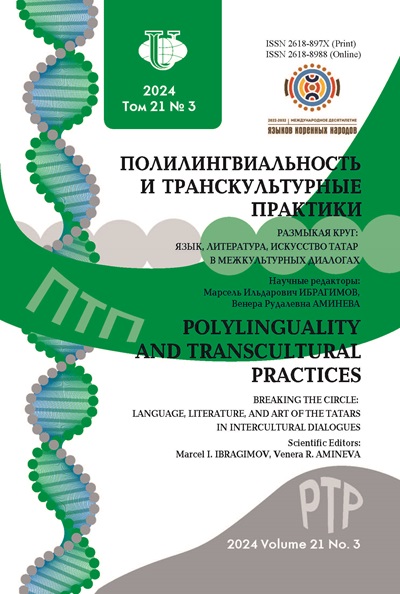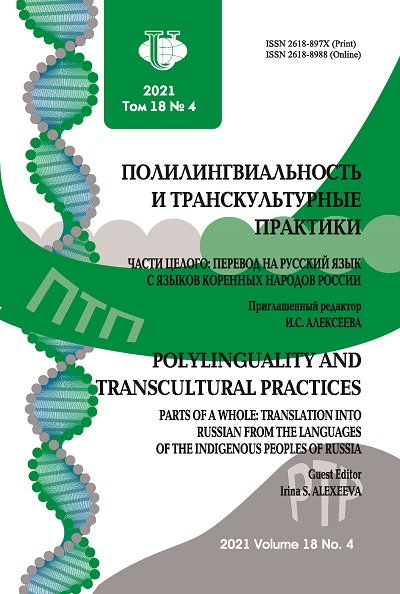A Multitude of Languages - and One Country: Building up Communication among the Peoples of Russia through Translation
- Authors: Alexeeva I.S.1
-
Affiliations:
- Herzen State Pedagogical University of Russia
- Issue: Vol 18, No 4 (2021): PARTS OF A WHOLE: TRANSLATION INTO RUSSIAN FROM THE LANGUAGES OF THE INDIGENOUS PEOPLES OF RUSSIA
- Pages: 332-346
- Section: Articles
- URL: https://journals.rudn.ru/polylinguality/article/view/29670
- DOI: https://doi.org/10.22363/2618-897X-2021-18-4-332-346
Cite item
Full Text
Abstract
The article gives a survey of the problematics, historic and cultural practice of maintaining and developing the ethnic languages of Russia through translation; it retrospectively describes the history of polycultural co-existence (including the unified method of presentation for children’s folk lore in S. Marshak’s version) and outlines the ways of dealing with today’s urgent problems of preserving ethnic language. The article describes the models of reconstructing the lost texts and the strategies of translating the texts of small ethnic groups, as well as the models of maintaining the quality of translation from Russia’s ethnic languages into Russian. We especially stress the importance of the Russian language in its role of the cultural mediator. The article pays due attention to the need to develop specific practiceoriented theories of translation which would embrace the global experience in translatology and take into account the specificity of ethno-centric mentality and the ways to keep it in translation. The article is an introduction to the following materials in the volume.
About the authors
Irina S. Alexeeva
Herzen State Pedagogical University of Russia
Author for correspondence.
Email: i.s.alexeeva@gmail.ru
ORCID iD: 0000-0001-8351-1700
Candidate of Philology, Professor of the Department of Translation
48, Moika River Embk, St. Petersburg, 191186, Russian FederationReferences
- Yazyk Severa. Conference Proceedings. Moscow, March, 18, 2020. Moscow: Politicheskaya entsiklopediya publ., 2020. Print. (In Russ.)
- Alekseeva, I.S. 2021. “Perevod literatury korennykh malochislennykh narodov Severa”. In Chelovek Severa v polikul’turnom i perevodcheskom prostranstve: tvorcheskoe nasledie Anny Nerkagi: monografiya. Tyumen’: Tyumen University publ. Print. (In Russ.)
- Literaturnyi Sankt-Peterburg. XX vek: entsiklopedicheskii slovar’. V 3 t. 2015. Vol. 1. Saint Petersburg. Print. (In Russ.)
- Lyubarskaya, A.I. 1995. “Za gran’yu proshlykh dnei: zametki o Marshake i ego redaktsii”. Neva 2: 162—171. Print. (In Russ.)
- Lyubarskaya, A.I. 1987. “On mezhdu nami zhil”. Detskaya literatura 10: 15—21. Print. (In Russ.)
- Nenetskie skazki. 1954. GUPI Minprosveshcheniya RSFSR, Moscow-Leningrad. Print. (In Russ.)
- Zhuravlinoe pero. 1968. Skazki narodov Krainego Severa. Moscow-Leningrad. Print. (In Russ.) 8. Kalevala. Karelo-finskii epos. 1975. Leningrad: Detskaya literatura publ. Print. (In Russ.)
- Ogon’-kamen’. 1981. Skazki narodov Tyumenskogo Severa. Moscow-Leningrad. Print. (In Russ.)
- Alekseeva, I.S., Antonova A.M., Kabakchi V.V. 2018. “Foreword. Multilingualism: Fair Play”. In Multilingualism and Russia’s Ethnic Cultures Through English, French, German, Russian and Other Languages: collection of articles. Saint Petersburg. Print. (In Russ.)
- Kabakchi, V.V. 2009. Angloyazychnoe opisanie russkoi kul’tury. Russian Culture Through English: Manual for Students. Moscow: Izdatel’skii tsentr “Akademiya” publ. Print. (In Russ.)
- Kabakchi, V.V., Beloglazova E.V. 2012. Vvedenie v interlingvokul’turologiyu. Saint Petersburg : SPbGUEF publ. Print. (In Russ.)
- Zaiceva, N. Virantanaz: [Vepsläine epos]. 2012. Edited by Markku Nieminen. Kuhmo: Juminkeko publ. Print. (In Russ.)
- Philippi, D.L. 1979. “Song of the Owl God”. In Songs of Gods, Songs of Humans. The Epic Tradition of the Ainu. Tokyo: University of Tokyo Press. Pp. 137—148. Print.
- Ma. Antologiya-bilingva slovesnogo tvorchestva korennykh malochislennykh narodov Khabarovskogo kraya. Edited by I.S. Alekseeva, M.V. Osipova. (In print)















